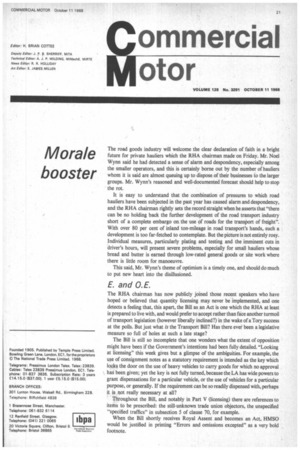Morale booster
Page 23

If you've noticed an error in this article please click here to report it so we can fix it.
The road goods industry will welcome the clear declaration of faith in a bright future for private hauliers which the RHA chairman made on Friday. Mr. Noel Wynn said he had detected a sense of alarm and despondency, especially among the smaller operators, and this is certainly borne out by the number of hauliers whom it is said are almost queuing up to dispose of their businesses to the larger groups. Mr. Wynn's reasoned and well-documented forecast should help to stop the rot.
It is easy to understand that the combination of pressures to which road hauliers have been subjected in the past year has caused alarm and despondency, and the RHA chairman rightly sets the record straight when he asserts that "there can be no holding back the further development of the road transport industry short of a complete embargo on the use of roads for the transport of freight". With over SO per cent of inland ton-mileage in road transport's hands, such a development is too far-fetched to contemplate. But the picture is not entirely rosy. Individual measures, particularly plating and testing and the imminent cuts in driver's hours, will present severe problems, especially for small hauliers whose bread and butter is earned through low-rated general goods or site work where there is little room for manoeuvre.
This said, Mr. Wynn's theme of optimism is a timely one, and should do much to put new heart into the disillusioned.
E. and 0.E.
The RHA chairman has now publicly joined those recent speakers who have hoped or believed that quantity licensing may never be implemented, and one detects a feeling that, this apart, the Bill as an Act is one which the RHA at least is prepared to live with, and would prefer to accept rather than face another turmoil of transport legislation (however liberally inclined?) in the wake of a Tory success at the polls. But just what is the Transport Bill? Has there ever been a legislative measure so full of holes at such a late stage?
The Bill is still so incomplete that one wonders what the extent of opposition might have been if the Government's intentions had been fully detailed. "Looking at licensing" this week gives but a glimpse of the ambiguities. For example, the use of consignment notes as a statutory requirement is intended as the key which locks the door on the use of heavy vehicles to carry goods for which no approval has been given: yet the key is not fully turned, because the LA has wide powers to grant dispensations for a particular vehicle, or the use of vehicles for a particular purpose, or generally. If the requirement can be so readily dispensed with, perhaps it is not really necessary at all?
Throughout the Bill, and notably in Part V (licensing) there are references to items to be prescribed: the still-unknown trade union objectors, the unspecified "specified traffics" in subsection 5 of clause 70, for example.
When the Bill shortly receives Royal Assent and becomes an Act, HMSO would be justified in printing -Errors and omissions excepted" as a very bold footnote.












































































































